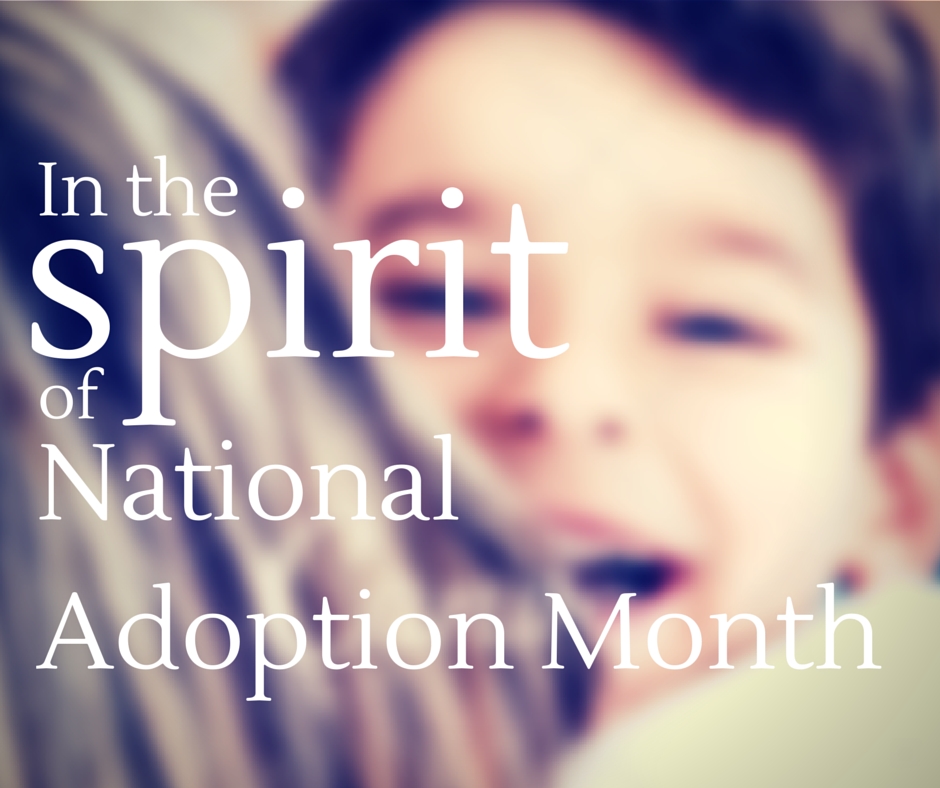Webster Dictionary defines Adoption as “The act or process of giving official acceptance or approval to something.” But what does adoption really mean? As an adult who was adopted as an infant, it means a great deal. It has meant that I was chosen and loved by a generous and caring couple. Adoption meant that I gained an older brother who may not be blood related to me, but he would protect me to the end of the world. As a Child Welfare worker almost 30 years later, the idea of adoption takes on a whole new meaning. I have seen children come into Foster Care after what seems to be a nightmare of a childhood. I have seen biological parents turn their lives around and re-create themselves after realizing that they have every possibility of losing their children to “The System.” But I have also seen children left in the abyss of Foster Care, with parental rights terminated, and no extended family to take them in. I have had the awful conversation with children who cannot be matched with a “forever family,” and remind them that they are special and deserve to be loved.
But…I have seen a silver lining. I have watched as the community has come together to meet children who are searching to belong. I have seen the excitement in a couple’s or individual’s face as I explain to them that adoption from foster care is not only a viable option, but a way to build their family and change a child’s life from negative to positive!
In the spirit of National Adoption Month, I want to invite any families out there to look into the idea of Adoption from Foster Care. This is also commonly referred to as “Special Needs Adoption.” Special needs in Child Welfare may range from medically fragile children to those with emotional or behavioral needs. Children who are in Foster Care have been removed from their biological home based on Child Protective Services (CPS) and a judge ruling that a child has been abused or neglected in their home or by someone responsible for their care. Biological Parents are given approximately one year to work with the court and the foster care agency in the hopes of resolving their issues and having their children returned home. If a parent is not able to make these efforts in a reasonable amount of time, then the Foster Care Agency can make a recommendation to “Terminate Parental Rights” to the children in care. From this point, the Foster Care Agency places the children for adoption. Children under 14 are automatically given a goal of Adoption, and the search for permanence begins. Children ages 14 and up have the choice of whether or not they would like to be adopted, or would rather have a goal that leans towards Guardianship, Independent Living, or Emancipation, based on their age and maturity level. Regardless of their age, there are children asking for a family to call their own. This is where we need you. We need families of all kinds to change a child’s life forever. To help these children know and believe that they are capable of great things, including belonging and being loved.
Special Needs Adoption is a viable possibility throughout the state, and across the country. Although there are many Child Welfare Agencies throughout Michigan, they are all licensed through the state, and are required to follow certain policies and procedures. Each county in Michigan has a Child Welfare Department, as well. These policies may seem a bit excessive as you go through the licensing and adoption process, but they are there in order to maintain the safety of the nearly 13,000 children who are in foster care at any given time. Policies that are enforced for licensed foster and adoptive parents range from providing regular medical care to the square footage that each bedroom needs to be for the children in your home. Again, many of the rules may seem basic or invasive, but this is the state’s way of caring for so many children at any given time. Some agencies may require your home to be licensed in order to adopt from foster care, and others may give an option of having a home study completed without a home being licensed. In order for a home to be licensed, an agency will assign a worker to go through the home to ensure that it is safe according to state policies. The Licensing worker will also interview parents, children, and references for the family in order to get a better sense of the family structure and what types of children will do well in the home. This “Home Study” is then submitted to the state with a recommendation to license a home for children who would be a best fit with the family.
Although the licensing process is a bit more strict, it can also mean longer transition times for the adoptee and the family before making a final decision to adopt or not, and can also mean that the adoption process itself may go quicker. Either option is extremely less expensive than Infant Adoption, which can range in cost from $10,000 to $30,000 or higher, if you are looking to do International Adoption. Special Needs Adoptions do not have the high price tag, as these are children who are actively looking for a home, and are waiting with the state in the meantime. These children feel the loss of not having a family as each day passes. No matter what you decide, know that there are ways that you can make a difference in a child’s life. Look below for some great resources about Foster Care and Adoption. The biggest piece of advice I can give is to simply ask yourself what you can do. There is no harm in asking, and you may be surprised by the answer you get.
There are many resources that someone can use to learn more about Foster Care and Special Needs Adoption. The first one that I recommend to anyone considering Special Needs Adoption is the Michigan Adoption Resource Exchange, or MARE. www.mare.org is a wonderful start in learning more about the licensing and adoption process in your area. It gives a well-rounded set of information, as well as connections to other resources and photo listings of children who are currently up for adoption. Wendy’s Wonderful Kids is a community through the Dave Thomas Foundation that helps focuses the efforts to find older children and siblings their forever homes. Go to www.davethomasfoundation.org for more information, or to help out in any way you can. You can also call the Foster Parent Navigator Program to become a licensed foster parent, or to learn about the Foster Care and Adoption Agencies in your area! Visit www.fcnp.org for more information about the Navigators.
 Becky Van Etten has worked in Child Welfare for over 4 years, first as a Foster Care Case Manager, and now working as a Foster and Adoptive Home Recruitment and Retention Specialist. She currently works with foster and adoptive families, training them so that parents are prepared for working with the Michigan Family Court System, the Child Welfare System, and how to address the needs of children in foster care while they are placed in Foster and Adoptive homes.
Becky Van Etten has worked in Child Welfare for over 4 years, first as a Foster Care Case Manager, and now working as a Foster and Adoptive Home Recruitment and Retention Specialist. She currently works with foster and adoptive families, training them so that parents are prepared for working with the Michigan Family Court System, the Child Welfare System, and how to address the needs of children in foster care while they are placed in Foster and Adoptive homes.











